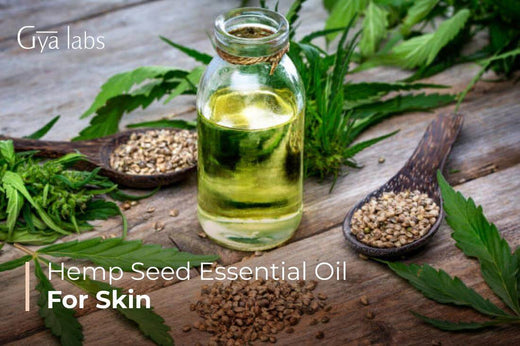Overview
In the pursuit of profound relaxation and heightened mindfulness, the integration of essential oils into meditation practices has emerged as a powerful and beneficial ritual. The effects of essential oils extend beyond mere aromas, tapping into the very essence of well-being.
In this article, we are going to discuss some of the best essential oils to support your meditation practice. Also, we have discussed the benefits of the essential oils, and how to use these oils for meditation. So, let's discover the best essential oils that you can use in spiritual practice including meditation and yoga.
Best Essential Oils For Meditation
The following essential oils are best known for its use in practicing meditation:
1. Lavender Essential Oil
This oil is one of the most popular essential oils that is being used widely for many different purposes. Lavender oil, extracted from lavender flowers, is renowned for its calming aroma. Its enchanting scent helps alleviate stress and anxiety, creating an ideal atmosphere for meditation. Inhaling lavender oil promotes relaxation, paving the way for a more profound and centered meditation experience.
2. Frankincense Essential Oil
Derived from the resin of Boswellia trees, frankincense oil has been a staple in spiritual practices for centuries. Its earthy and woody fragrance uplifts the spirit, fostering a deeper connection with one's inner self during meditation. Frankincense oil is a timeless companion for those seeking transcendence in their mindfulness journey. This is a great essential oil for meditation and yoga practice.
For more information on the spiritual benefits of Frankincense Essential Oil, check out our article on Frankincense Essential Oil: Spiritual Benefits
3. Sandalwood Essential Oil
This is one of the most commonly known grounding essential oils. Sandalwood oil, extracted from the heartwood of sandalwood trees, exudes a warm and grounding aroma. Known for its ability to balance energies, this oil provides a serene backdrop for meditation. Inhaling sandalwood oil fosters a sense of inner peace, making it an excellent choice for those aiming to achieve mindfulness and stability.
4. Peppermint Essential Oil
With its refreshing and invigorating scent, peppermint oil adds a burst of energy to your meditation space. Derived from the peppermint plant, this oil stimulates the senses, promoting alertness and focus. Incorporating peppermint oil into your meditation routine can be particularly beneficial during sessions that require mental clarity and concentration.
5. Ylang Ylang Essential Oil
Extracted from the flowers of the Cananga tree, ylang-ylang oil boasts a sweet and floral fragrance. This oil is celebrated for its ability to promote harmony and joy. This essential oil can help elevate the overall mood, creating a blissful ambiance that enhances the emotional aspects of the practice.
6. Bergamot Essential Oil
Bergamot oil, derived from the rind of bergamot oranges, offers a citrusy and uplifting aroma. This oil is a natural mood enhancer, making it a valuable addition to meditation sessions focused on positivity and optimism. Inhaling bergamot oil can instill a sense of brightness and warmth, transforming your meditation space into a haven of sunshine.
7. Rosemary Essential Oil
Known for its herbaceous and invigorating scent, rosemary oil is a champion in promoting mental clarity. This oil, extracted from the leaves of the rosemary plant, aids in concentration and memory retention. Including rosemary oil in your meditation routine can sharpen your focus and create an environment conducive to deep introspection.
8. Cedarwood Essential Oil
Cedarwood oil, obtained from cedarwood trees, emanates a warm and woody fragrance. This oil is revered for its grounding properties, inviting a sense of stability and wisdom during meditation. Inhaling cedarwood oil connects you with the grounding energy of nature, enriching your meditation experience with a profound sense of rootedness. It also has balancing properties that help keep your body and mind balanced and grounded.
9. Eucalyptus Essential Oil
With its fresh and invigorating aroma, eucalyptus oil is a powerhouse in clearing the mind and invigorating the spirit. Derived from the eucalyptus tree, this oil is a breath of fresh air, promoting respiratory health and mental clarity. Incorporating eucalyptus oil into your meditation space can create an atmosphere of rejuvenation and vitality.
10. Patchouli Essential Oil
Patchouli oil, extracted from the leaves of the patchouli plant, offers an earthy and grounding fragrance. This oil is celebrated for its tranquilizing effects, inducing a deep sense of calm and relaxation. Adding patchouli oil to your meditation routine provides a sensory journey into serenity, making it an invaluable companion for profound mindfulness practices.
Benefits Of Using Essential Oils For Meditation
1. Enhancing Mind-Body Connection
Using essential oils during meditation can enhance the mind-body connection, allowing individuals to more effectively meditate and delve into the profound depths of their inner selves. The aromas of certain oils create a sensory experience that promotes a seamless alignment between the mind and body during the practice of meditation.
2. Relaxing Essential Oils for Tranquility
Many essential oils are celebrated for their relaxing properties, making them ideal for promoting a sense of tranquility during meditation. The use of such oils can create a serene atmosphere, fostering a peaceful state of mind that is conducive to a more profound meditation practice.
3. Support for Yoga and Meditation
In the realm of yoga and meditation, essential oils play a crucial role in supporting the practitioner. The gentle aromas of certain oils can enhance the overall experience, creating a soothing environment that complements the goals of a meditative practice.
4. Grounding Meditation with Essential Oils
Certain oils are particularly effective in grounding the mind and body, making them ideal for grounding meditation. The use of these oils can enhance the sense of stability and rootedness, aligning seamlessly to achieve a deep and grounded state during meditation.
5. Spiritual Benefits of Essential Oils
The use of essential oils during meditation extends beyond the physical realm, offering spiritual benefits to those engaged in personal meditation practices. The aromas of specific oils have been associated with heightened spiritual experiences, facilitating a connection with the divine and promoting a sense of transcendence.
6. Aromatherapy in Meditation
The marriage of meditation and aromatherapy through the use of essential oils creates a holistic approach to well-being. The inhalation of these aromatic oils enhances the mindfulness experience, bringing an additional layer of sensory awareness to the practice of meditation.
7. Personalized Meditation Experience
Every individual's meditation journey is unique, and the use of meditation essential oils allows for a personalized experience. Selecting the ideal essential oil based on personal preferences and goals can tailor the meditation practice to suit individual needs.
8. Mindfulness and Focus
Certain oils are known for their ability to enhance mindfulness and focus. Incorporating these oils into your meditation routine can sharpen your concentration, allowing for a more profound and focused meditative practice.
9. Historical Use of Essential Oils in Meditation
The historical use of essential oils in meditation spans various cultures and traditions. The oils have been revered for their transformative properties, contributing to the overall efficacy of meditation practices throughout history.
10. Holistic Well-being
Using essential oils in meditation is a great way to promote holistic well-being. The therapeutic properties of these oils, combined with the mindful practice of meditation, create a synergistic effect that benefits not only the mind but also the body and spirit.
Different Ways To Use Essential Oils For Meditation
1. Diffusing Aromas for a Tranquil Atmosphere
Using a diffuser is one of the most popular ways to disperse the soothing scents of essential oils throughout your meditation space. Create custom diffuser blends that resonate with your mood or meditation focus, allowing the aromas to envelop your surroundings and guide you into a state of deep relaxation.
2. Topical Application with Carrier Oils
Blend your chosen essential oils with a carrier oil like jojoba oil, to create a soothing concoction for topical application. Gently massage the diluted mixture onto pulse points or the soles of your feet before starting your meditation session. This method ensures a subtle and prolonged release of the oils, promoting a continuous sensory experience.
3. Inhaling Directly for Immediate Effects
For a quick and direct impact, inhale the aroma of essential oils directly from the bottle or your palms. Cup your hands around a few drops of your chosen oil, take a few deep breaths, and let the transformative effects of the oil envelop you. This method is ideal for moments when you need an instant shift in focus or mood during your meditation or yoga practice.
4. Adding Oils to Meditation Tools
Infuse your meditation tools, such as cushions or eye masks, with your preferred essential oils. This subtle infusion allows you to surround yourself with therapeutic scents as you engage in your meditation, creating a multisensory experience that enhances the effects of the oils.
5. Including Oils in Pre-meditation Rituals
Incorporate essential oils into your pre-meditation rituals to signal the transition into a meditative state. Whether it's through a scented candle, a few drops on your wrists, or a gentle misting spray, the use of oils in these rituals can serve as a powerful cue for your mind to prepare for the upcoming meditation session.
6. Using Oils in Meditation Practices
Integrate essential oils directly into your meditation practices by anointing specific areas of your body with diluted oils. For example, dab a drop of oil on your third eye (forehead) or heart center (chest) to enhance spiritual connection and emotional balance during meditation.
7. Crafting Personalized Meditation Blends
Experiment with creating personalized blends of essential oils tailored to your specific goals for meditation. Whether you seek grounding, focus, or relaxation, the art of crafting your perfect blend allows you to curate a sensory experience that aligns with the intended effects of your meditation session.
8. Utilizing Oils in Spiritual Practices
Extend the use of essential oils beyond meditation to support your broader spiritual practices. Infuse oils into rituals, ceremonies, or moments of reflection, creating a holistic and spiritually enriching environment.
9. Exploring Multi-sensory Meditation
Engage multiple senses by combining essential oils with other sensory elements, such as soothing music or gentle lighting. This multi-sensory approach deepens the immersive experience, helping you achieve a heightened state of mindfulness during your meditation.
10. Enhancing Meditation Tools with Oils
Enrich your meditation tools, such as crystals or meditation beads, with the subtle scents of essential oils. This infusion adds an extra layer of sensory engagement, amplifying the effects of both the tools and the oils in your meditation practice.
DIY Essential Oil Blends For Meditation
Recipe #1 - Tranquil Harmony Meditation Blend
Ingredients:
- 4 drops Lavender essential oil
- 3 drops Frankincense essential oil
- 2 drops Bergamot essential oil
- 1 tablespoon Jojoba oil (carrier oil)
Instructions:
- In a small glass bottle, combine the specified drops of Lavender, Frankincense, and Bergamot essential oils.
- Add the Jojoba oil as a carrier to the essential oil blend.
- Secure the bottle cap and gently shake the mixture to ensure thorough blending.
How to Use: This calming blend can be rubbed onto your pulse points, such as wrists and temples, before the start of your meditation session. The soothing aroma promotes relaxation, helping you ease into a state of tranquility during your practice.
Benefits:
- Lavender promotes calmness and reduces stress.
- Frankincense enhances spiritual connection and deepens meditation.
- Bergamot uplifts the mood and adds a touch of brightness to your meditation space
Recipe #2 - Serene Sanctuary Room Spray
Ingredients:
- 10 drops Sandalwood essential oil
- 5 drops Vetiver essential oil
- 5 drops Chamomile essential oil
- 2 ounces Distilled water
Instructions:
- Create a room spray by using a small spray bottle, and combine the specified drops of Sandalwood, Vetiver, and Chamomile essential oils.
- Add the distilled water to the essential oil blend.
- Close the spray bottle and shake well to ensure proper mixing.
How to Use: Before starting your meditation or yoga session, lightly mist your meditation space with this room spray. The grounding and calming scents will create a serene sanctuary, enhancing your mindfulness and meditation experience.
Benefits:
- Sandalwood essential oil is known for grounding and balancing energies.
- Vetiver essential oil brings a sense of stability and focus to your practice.
- Chamomile essential oil promotes relaxation and soothes the mind.
Recipe #3 - Mindful Bliss Meditation Roll-On
Ingredients:
- 5 drops Ylang Ylang essential oil
- 3 drops Patchouli essential oil
- 2 drops Cedarwood essential oil
- 1 tablespoon Sweet Almond oil (carrier oil)
Instructions:
- Mix the specified drops of Ylang Ylang, Patchouli, and Cedarwood essential oils in a small rollerball bottle.
- Add Sweet Almond oil as the carrier oil to the essential oil blend.
- Secure the rollerball cap and gently roll the bottle between your palms to mix the oils.
How to Use: Apply the roll-on blend to your wrists, neck, or the back of your neck before you begin your meditation. The exotic scents will create a blissful atmosphere, enhancing your overall meditation experience.
Benefits:
- Ylang Ylang essential oil promotes harmony and joy.
- Patchouli essential oil induces a deep sense of calm and relaxation.
- Cedarwood essential oil provides a grounding and comforting effect.
Recipe #4 - Clarity and Focus Meditation Diffuser Blend
Ingredients:
- 6 drops Peppermint essential oil
- 4 drops Rosemary essential oil
- 2 drops Eucalyptus essential oil
Instructions:
- Add the specified drops of Peppermint, Rosemary, and Eucalyptus essential oils to your diffuser.
- Turn on the diffuser and let the invigorating aroma fill the air.
How to Use: Use this diffuser blend during your meditation or yoga practice to promote mental clarity and focus. The refreshing scents will help you stay alert and present throughout your session.
Benefits:
- Peppermint essential oil stimulates the senses and promotes alertness.
- Rosemary essential oil aids in concentration and mental clarity.
- Eucalyptus essential oil provides a fresh and invigorating atmosphere.
You can also experiment with different essential oils or include your favorite essential oils in the above blend, as many different oils are ideal for meditation.
Risks And Precautions Of Using Essential Oils For Meditation
While the use of essential oils can enhance your meditation experience, it's essential to be aware of potential risks and take necessary precautions to ensure a safe and enjoyable practice. Here are some considerations:
1. Skin Sensitivity
Risk: Some individuals may have skin sensitivities or allergic reactions to certain essential oils, especially when applied directly to the skin.
Precaution: Always perform a patch test before applying essential oils topically. Dilute oils with a carrier oil, and if irritation occurs, discontinue use.
2. Photosensitivity
Risk: Certain citrus essential oils, such as Bergamot, may increase sensitivity to sunlight, leading to skin damage.
Precaution: Avoid applying photosensitive oils before exposure to sunlight. If used topically, wait for a few hours before going outdoors.
3. Allergies
Risk: Individuals with allergies to specific plants may also be allergic to the corresponding essential oils.
Precaution: Be mindful of personal allergies and choose oils carefully. Consult with a healthcare professional if uncertain.
4. Respiratory Issues
Risk: Inhalation of concentrated essential oils may trigger respiratory issues in some individuals.
Precaution: Use essential oils in well-ventilated spaces. If you have respiratory conditions, consult a healthcare professional before inhaling essential oils.
5. Interaction with Medications
Risk: Certain essential oils may interact with medications, affecting their efficacy.
Precaution: Consult with a healthcare provider, especially if you are on medication, to ensure there are no contraindications with the essential oils you intend to use.
6. Pregnancy and Nursing
Risk: Pregnant or nursing individuals should exercise caution with essential oils, as some may pose risks to the baby.
Precaution: Consult with a healthcare professional before using essential oils during pregnancy or while nursing.
7. Quality of Essential Oils
Risk: Poor-quality essential oils may contain impurities or synthetic additives, posing potential health risks.
Precaution: Choose high-quality, pure essential oils from reputable suppliers to ensure safety and effectiveness.
8. Children and Pets
Risk: Essential oils can be too potent for children and pets, leading to adverse reactions.
Precaution: Keep essential oils out of reach of children and pets. Use kid-safe blends or consult a veterinarian for pet-safe options.
9. Internal Use
Risk: Ingesting essential oils without proper guidance can be harmful.
Precaution: Do not ingest essential oils without the supervision of a qualified aromatherapist or healthcare professional.
10. Overuse and Sensitization
Risk: Prolonged or excessive use of certain essential oils may lead to sensitization, reducing their effectiveness over time.
Precaution: Rotate oils and use them judiciously. If sensitivity develops, give your body a break from the oil.
Conclusion
Essential oil has been used since centuries to support the meditation practice. he perfect essential oils, carefully chosen, may help create a serene space for your meditation. Whether diffused around, applied directly, or used in meditation, these oils weave a tapestry of scents, making your meditation a sensory journey. Essential oil is a beneficial companion, enriching your mindfulness journey with tranquility and balance.















